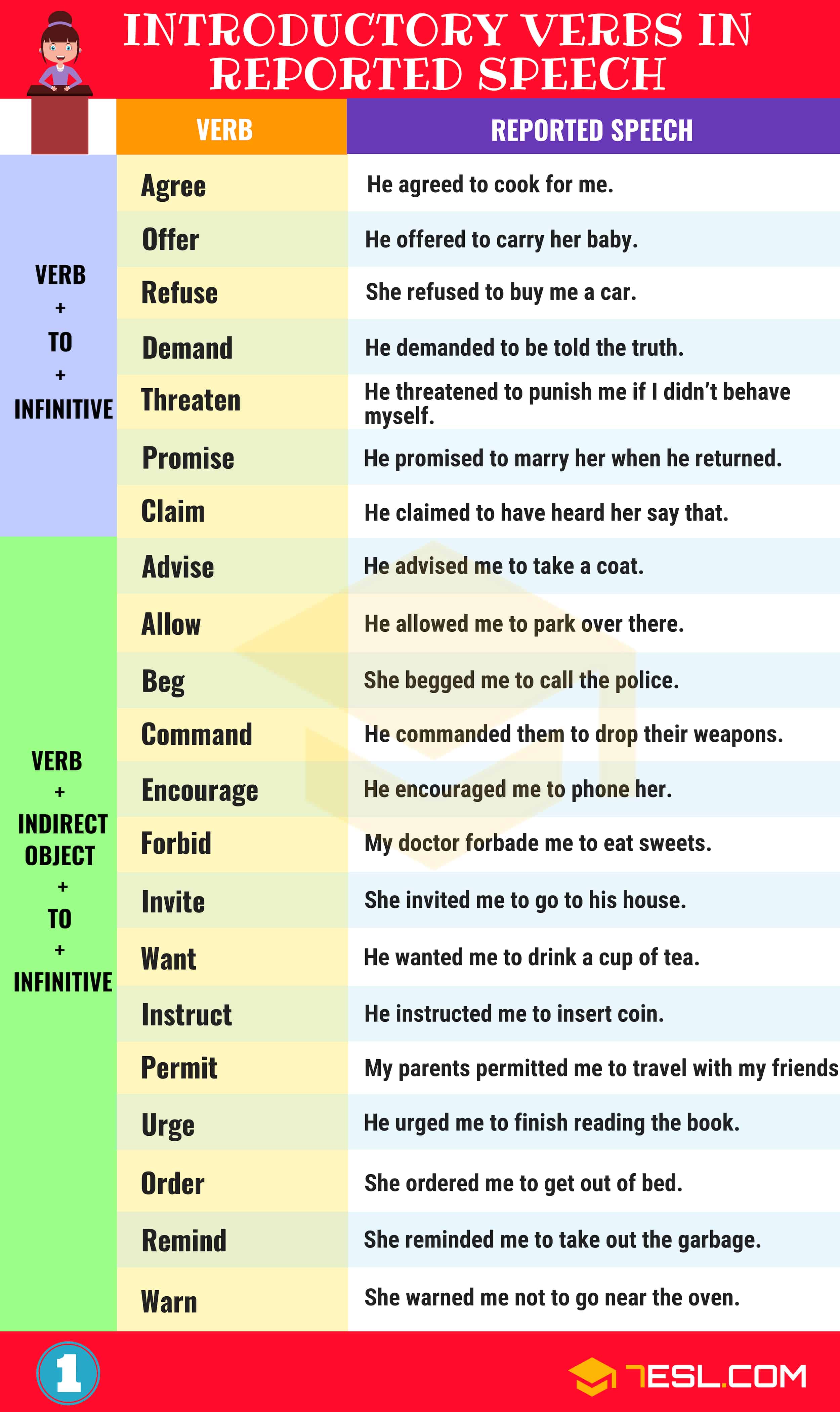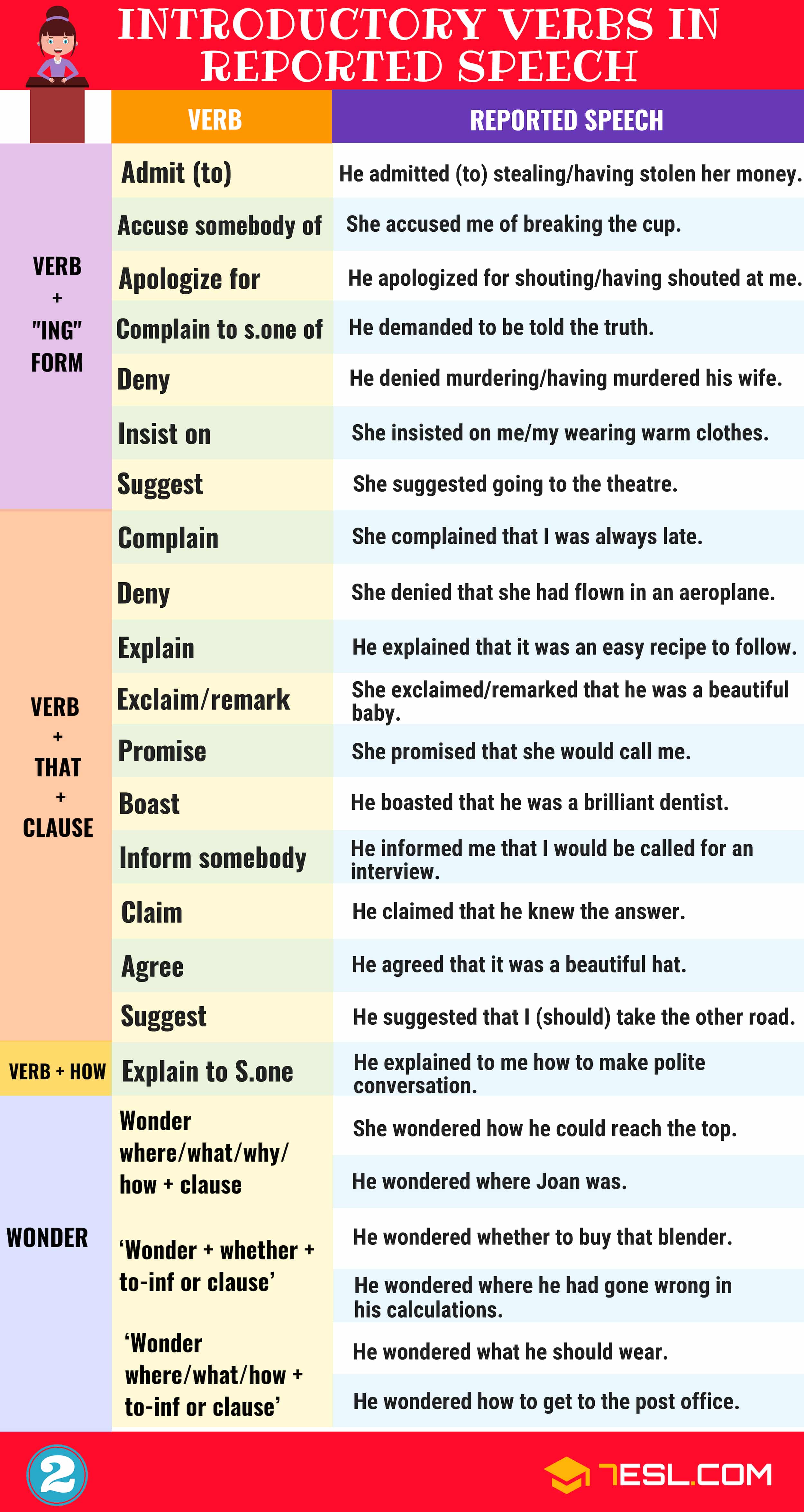Verb tense forms usually need to change. The tenses generally move backwards in this way:
- Present Simple Tense into Past Simple Tense
- Present Continuous Tense into Past Continuous Tense
- Present Perfect Tense into Past Perfect Tense
- Past Simple Tense into Past Perfect Tense
- Past Continuous Tense into Past Perfect Continuous Tense
- Past Perfect Tense (The tense remains unchanged)
- Will into Would
- Will be into Would be
- Will have into Would have
- Will have been into Would have been
Other Verb Form Changes in Indirect Speech
- Can into Could
- Could (The verb remains unchanged)
- Have to into Had to
- Must into Must/Had to
- May into Might
- Might (The verb remains unchanged)
- Should (The verb remains unchanged)
Tense Changes in Reported Speech | Image
Changes in Time and Place in Reported Speech
Time and place references often have to change in Indirect Speech
- Now –> Then
- Today –> That day
- Here –> There
- This –> That
- Tomorrow –> The following day/ The next day/ The day after
- Next week –> The following week/ The next week/ The week after
- Yesterday –> The previous day/ The day before
- Last week –> The previous week/ The week before
- Ago –> Previously/ Before
- Tonight –> That night
Changes in Time and Place in Reported Speech | Image
No Change in Verb Tenses in Reported Speech
- The introductory verb is in the Present, Present Perfect or Future.
- If the reported sentence deals with a fact or general truth.
- The reported sentence contains a time clause.
- The verb of the sentence is in the unreal past (the second or the third conditional).
- The subjunctive stays unchanged in the subordinate clause.
- Had better, could, would, used to, should, might, ought to and mustn’t remain unchanged.
- If the speaker reports something immediately or soon after it was said.
No Change in Verb Tenses in Reported Speech | Image
Introductory Verbs in Reported Speech
- Tell, say, ask
- Verb + that + clause: complain, deny, explain, exclaim, remark, promise, boast, inform somebody, claim, agree, suggest
- Verb + to + infinitive: agree, offer, refuse, demand, threaten, promise, claim
- Verb + indirect object + to + infinitive: advise, allow, beg, command, encourage, forbid, invite, want, instruct, permit, urge, order, remind, warn
- Verb + “ing” form: admit (to), accuse somebody of, apologize for, boast about/ of, complain to somebody of, deny, insist on, suggest
- Verb + how: explain to somebody
- Wonder
Introductory Verbs in Indirect Speech | Image 1
Introductory Verbs in Indirect Speech | Image 2
Changes of Pronouns in Reported Speech
In indirect speech, you need to be careful with personal pronouns. They need to be changed according to the situation. You need to know the context.
Changes of Pronouns in Indirect Speech | Image
Reported Questions in English
When you are changing a question from direct speech into indirect speech, you follow the same kinds of rules as for statements.
To report a question, we use verbs such as: inquire, wonder, want to know, ask…
Reported Questions in English | Image
Reported Commands and Requests in English
Reported Orders, Commands and Requests are formed using the to-infinitive and not to-infinitive.
The reporting verbs for the orders/ commands/ requests are: order, shout, demand, warn, beg, command, tell, insist, beseech, threaten, implore, ask, propose, forbid…
When we change from direct to indirect speech, the pronoun and tense changes that are also needed.
Reported Commands and Requests in English | Image

















































